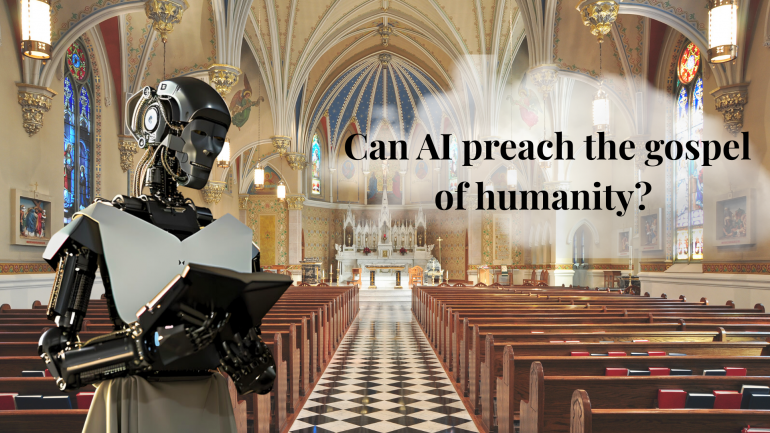Can AI preach the gospel of humanity?

I recently came across an AFP feature titled “People of Faith Divided as AI Enters Religion.” It explored how artificial intelligence is quietly making its way into places of worship, from chatbots that let users “text with Jesus” to pastors experimenting with AI-generated sermons.
For me, the article raised a haunting question: in an age where algorithms can imitate empathy, what becomes of the human soul of religion?
Artificial intelligence, the technology transforming nearly every corner of modern life, is now entering the sacred. Yet as faith communities navigate this digital frontier, they are also confronting a deeper dilemma: can a machine that knows everything about Scripture truly understand the human heart?
Apps like Text with Jesus and AI Buddha, Deen Buddy for Islam, Vedas AI for Hinduism, now promise spiritual guidance at the touch of a button. Some users find comfort in their immediacy, a kind of digital confessional open 24 hours a day. Others, however, sense something missing: the warmth of human presence, the tremor of compassion in a real voice, the silent strength of shared prayer.
Mixed Reactions
Even within the Church, reactions have been mixed. According to the article, one Catholic ministry that launched an animated priest avatar, “Father Justin,” had to remove his title after backlash from the faithful who found it unsettling, even irreverent.
The developers later explained, “We don’t want to replace humans, we just want to help.” The sentiment was noble, but it revealed the anxiety many believers share: when the sacred becomes simulated, does faith risk losing its humanity?
Religion, after all, relies on qualities that machines lack, conscience, vulnerability, and love. A chatbot may interpret the Gospel of Luke, but it cannot look into your eyes and recognise your pain. It can recite the Psalms, but it cannot weep with you when you lose someone you love.
Faith is not merely about knowing the Word; it is about living it, feeling its pulse in community and communion. It is passed not through code, but through conversation; not through data, but through the deep exchange of hearts.
In every generation, the Church has faced technological revolutions, the printing press, the radio, television, and now artificial intelligence. Each brought opportunities and perils. The printing press democratized access to Scripture, but it also fractured the unity of interpretation. Television brought the Mass to the homebound, but also commodified religion into spectacle.
AI is different. It does not merely transmit faith; it mimics it. It learns from us, then imitates us, including our prayers, our doubts, even our patterns of belief. That imitation is both astonishing and unnerving. When a machine tells you “God loves you,” it is not because it knows love; it is because it has learned the sequence of words that comfort the human mind.
Profound Theological Question
The theological question is profound: if faith is relational, as we believe it to be, what happens when one side of that relationship is artificial? Genesis tells us that humankind was made “in the image and likeness of God”, endowed with freedom, reason, and conscience. These are not programmable traits; they are gifts of the Spirit. AI, no matter how advanced, remains an imitation of that image, a reflection without soul.
And yet, technology has always mirrored the longings of its makers. Perhaps the rise of “virtual Jesus” and “AI Buddha” reveals something not about God, but about us, our hunger for immediacy, our impatience with silence, our need to make even the divine convenient.
As a journalist, I have seen what real faith looks like, in the quiet resilience of a nurse praying before her shift, in the trembling hands of a priest giving last rites, in the mother who lights a candle for her son in prison. These are acts that no algorithm can replicate because they spring from the mystery of love freely given.
When I recall those scenes, I realise that faith is most alive not in efficiency, but in empathy; faith is not in data, but in the delicate imperfection of human presence. It is precisely our frailty that makes grace possible.

AI has a Place in Matters of Faith, But …
This is not to say that artificial intelligence has no place in the life of faith. Used wisely, it can educate, inform, and even evangelise. It can help the isolated find a word of hope, or the curious discover Scripture anew. But religion is not an algorithm to be optimised. It is a mystery to be lived.
The Holy Father has urged that AI development be guided by what he calls “algorethics”, an ethics of the algorithm grounded in human dignity and the common good.
Perhaps that is the balance we need: to welcome innovation without surrendering incarnation. At its best, technology can amplify the Gospel; at its worst, it can hollow it out. The Church’s mission, therefore, is not to resist progress but to remind the world what true progress is, a movement toward deeper humanity, not its replacement.
For faith does not happen in the cloud. It happens on the ground, where people still reach out to hold one another’s hands, whisper a prayer, and believe that even in an age of machines, the human heart remains the oldest, most sacred technology of all.








